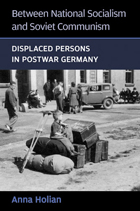
In May of 1945, there were more than eight million “displaced persons” (or DPs) in Germany—recently liberated foreign workers, concentration camp prisoners, and prisoners of war from all of Nazi-occupied Europe, as well as eastern Europeans who had fled west before the advancing Red Army. Although most of them quickly returned home, it soon became clear that large numbers of eastern European DPs could or would not do so. Focusing on Bavaria, in the heart of the American occupation zone, Between National Socialism and Soviet Communism examines the cultural and political worlds that four groups of displaced persons—Polish, Ukrainian, Russian, and Jewish—created in Germany during the late 1940s and early 1950s. The volume investigates the development of refugee communities and how divergent interpretations of National Socialism and Soviet Communism defined these displaced groups.
Combining German and eastern European history, Anna Holian draws on a rich array of sources in cultural and political history and engages the broader literature on displacement in the fields of anthropology, sociology, political theory, and cultural studies. Her book will interest students and scholars of German, eastern European, and Jewish history; migration and refugees; and human rights.
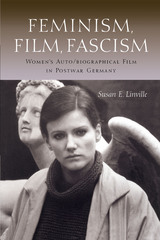
German society's inability and/or refusal to come to terms with its Nazi past has been analyzed in many cultural works, including the well-known books Society without the Father and The Inability to Mourn. In this pathfinding study, Susan Linville challenges the accepted wisdom of these books by focusing on a cultural realm in which mourning for the Nazi past and opposing the patriarchal and authoritarian nature of postwar German culture are central concerns—namely, women's feminist auto/biographical films of the 1970s and 1980s.
After a broad survey of feminist theory, Linville analyzes five important films that reflect back on the Third Reich through the experiences of women of different ages—Marianne Rosenbaum's Peppermint Peace, Helma Sanders-Brahms's Germany, Pale Mother, Jutta Brückner's Hunger Years, Margarethe von Trotta's Marianne and Juliane, and Jeanine Meerapfel's Malou. By juxtaposing these films with the accepted theories on German culture, Linville offers a fresh appraisal not only of the films' importance but especially of their challenge to misogynist interpretations of the German failure to grieve for the horrors of its Nazi past.
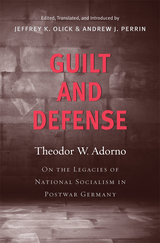
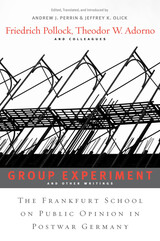
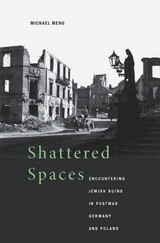
After the Holocaust, the empty, silent spaces of bombed-out synagogues, cemeteries, and Jewish districts were all that was left in many German and Polish cities with prewar histories rich in the sights and sounds of Jewish life. What happened to this scarred landscape after the war, and how have Germans, Poles, and Jews encountered these ruins over the past sixty years?
In the postwar period, city officials swept away many sites, despite protests from Jewish leaders. But in the late 1970s church groups, local residents, political dissidents, and tourists demanded the preservation of the few ruins still standing. Since the collapse of the Soviet Union in 1989, this desire to preserve and restore has grown stronger. In one of the most striking and little-studied shifts in postwar European history, the traces of a long-neglected Jewish past have gradually been recovered, thanks to the rise of heritage tourism, nostalgia for ruins, international discussions about the Holocaust, and a pervasive longing for cosmopolitanism in a globalizing world.
Examining this transformation from both sides of the Iron Curtain, Michael Meng finds no divided memory along West–East lines, but rather a shared memory of tensions and paradoxes that crosses borders throughout Central Europe. His narrative reveals the changing dynamics of the local and the transnational, as Germans, Poles, Americans, and Israelis confront a built environment that is inevitably altered with the passage of time. Shattered Spaces exemplifies urban history at its best, uncovering a surprising and moving postwar story of broad contemporary interest.

Vanguard of Nazism is the first full history of the German Free Corps and of its contributions to the rise of Nazism. This dramatic and horrifying story sheds new light on a dark corner of the recent past, and it has an unhappy relevance to neo-Nazist tendencies in Germany today.
The newly established Weimar Republic, defenseless against the Communists, hired groups of volunteer soldiers (the Free Corps) to fight for it. These volunteers—born of the pre–World War I youth movement, nourished on the battlefields of the War, unreconciled to defeat and determined to avenge it—fought for the Republic (which they despised) from Munich to Berlin, from Düsseldorf to the Baltic. When the Republic, in fear, tried to disband them, they went underground until they reappeared in the brown shirts of the Nazis.
The savage spirit, brutal acts, and perverted ideology of the men whom Hermann Goering called “the first soldiers of the Third Reich” stand out in glaring relief in this record. The book is based on contemporary newspaper accounts and government documents, but the story it tells would hardly be credible were it not for the memoirs of the Free Corps fighters themselves, from which Robert G. L. Waite quotes liberally. With this material, Waite is able to show that the Free Corps contributed to Hitler’s Germany powerful political shock troops, labor camps, a youth movement, a well-developed Führer concept, and the basic tenets of National Socialist ideology.
The movement, half a million strong, swept Germany at a time when Hitler was an unknown political agitator. But when Hitler came to power, leaders of the Free Corps emerged as leaders of the Third Reich. Waite lists the names of these men in a valuable appendix to the book, which shows the activities of each man in both movements.
Waite emphasizes and substantiates the thesis that National Socialism really began in the months and years immediately following World War I. Aside from its importance as history, the story of these self-styled Freebooters has all the ingredients of a fantastic adventure tale: intrigues, conspiracies, quick reversals, and sudden death follow each other in dramatic succession.
READERS
Browse our collection.
PUBLISHERS
See BiblioVault's publisher services.
STUDENT SERVICES
Files for college accessibility offices.
UChicago Accessibility Resources
home | accessibility | search | about | contact us
BiblioVault ® 2001 - 2024
The University of Chicago Press









